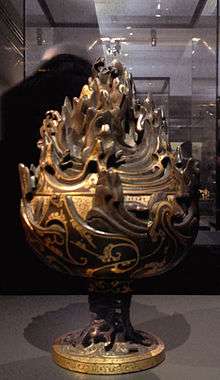Liu Sheng, Prince of Zhongshan
Liu Sheng (simplified Chinese: 刘胜; traditional Chinese: 劉勝; pinyin: Liú Shèng; died 113 BC), posthumously known as King/Prince Jing of Zhongshan (Chinese: 中山靖王; pinyin: Zhōngshān Jìng Wáng), was a king/prince of the Western Han empire of Chinese history. His father was Emperor Jing, and he was the elder brother of Emperor Wu of Han. His mausoleum is one of the most important archaeological sites pertaining to the Western Han imperial family, whose contents include the jade burial suits which encased him and his wife, Dou Wan.
Life

Liu Sheng was born to Emperor Jing of Han and Consort Jia, who also had another son, Liu Pengzu the Prince of Zhao. He was given the fief of Zhongshan by his father in 154 BC, and therefore reigned in the period right after the Rebellion of the Seven States, when the political atmosphere was one of suspicion regarding the feudal states. Given this atmosphere Liu Sheng was one of the more successful feudal rulers.
In the third year of the reign of Emperor Wu, his younger brother, Liu Sheng and several other princes were invited to Chang'an to feast; at the feast Liu Sheng wept and complained of the treatment of the feudal princes by centrally appointed officials, who made use of their role as monitors to constantly trump up charges against the princes. Impressed by this petition the Emperor explicitly ordered that the unfair scrutiny of the princes should stop, and Liu Sheng became one of the most renowned of the feudal rulers of his time.
He was known to indulge in alcohol and women, and is reputed to have had some 120 sons.
Personal information
- Father
- Emperor Jing of Han (9th son of)
- Mother
- Consort Jia
- Wives:
- Major Concubines:
- ?
- Children
- Descendant
- Liu Bei (161-223)
See also
References
| Prince Jing of Zhongshan Died: 113 BC | ||
| Chinese royalty | ||
|---|---|---|
| New title | Prince of Zhongshan 154 BC – 113 BC |
Succeeded by Liu Chang |